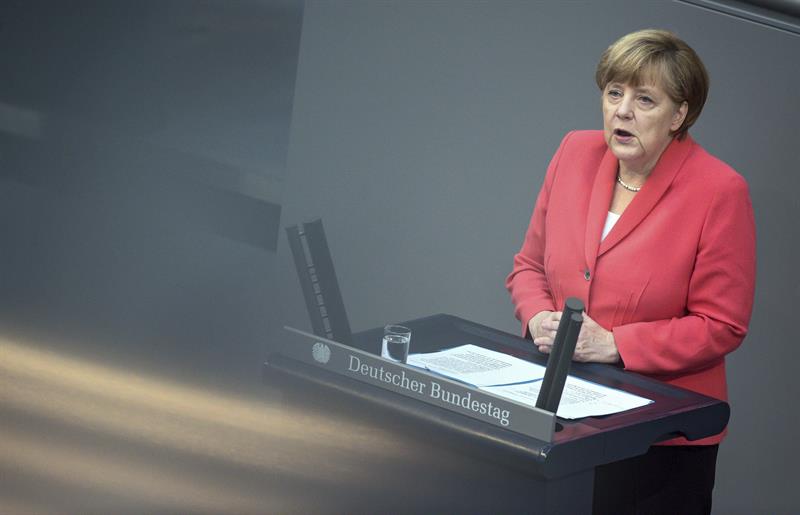A solid majority approved this colonialist pact despite several “no” votes from all party ranks. Outside of the parliament in Berlin, demonstrators gathered to protest the agreement. Already on Wednesday, hundreds had taken to the streets in solidarity with the Greek people.
After the German government had blackmailed the Syriza-led Greek government into complete capitulation to the Troika agreement on Sunday – dictating immediate austerity measures to be voted in the Greek parliament on Wednesday as a precondition for further negotiations –, an extraordinary session of the Bundestag took place this Friday. In this session, 439 of 598 present members of parliament voted in favor of negotiations with the Tsipras administration, with 119 representatives voting “no” and 40 abstaining.
As a result of yesterday’s approval, talks will soon begin with the Syriza government concerning the concretion of Sunday’s agreement into a third “memorandum”. In the meantime, a bridge financing will be granted to the Greek state. After this round of negotiations, the parliaments will have to vote once again in order to put the new memorandum into effect, which will cast workers, youth and seniors even more into misery.
Of the 119 members of parliament to vote “no”, 60 were members of the conservative Christian Democratic Union (CDU), chancelor Angela Merkel’s party. Thus, the number of representatives of the conservative fraction to vote against the government’s plans on Greece doubled in relation to the last vote in February, where 29 Christian Democrats said “no” in a vote on a credit renewal for Greece. However, the conservative “no” votes don’t mean that those politicians are against the practice of blackmail and extortion against the Greek population. Instead, they want to kick Greece out of the Euro zone and are against the memorandum because it would let Greece keep the common European currency.
Against the critics in her own party, Merkel sustained that the “benefits outweigh the costs”. Finance minister Wolfgang Schäuble, Merkel’s second-in-command, gave an ambiguous speech in parliament and didn’t pronounce himself unmistakably with regards to the “temporary Grexit” he had proposed and defended throughout the entire week.
The Social-Democratic Party (SPD), the CDU’s partner in coalition, voted almost unanimously for the agreement. Only four voted “no”, 175 voted “yes”. The Green party was split in half: 23 members voted for the agreement, 33 abstained, and two voted “no”.
The only party to position itself almost unanimously against the proposal was the Left Party, with 53 parliamentarians voting “no”. However, there were also two abstentions, which show that there are some disagreements inside the party as to how to position themselves in this conflict. In February, the parliamentary fraction had even voted “yes” in a vote on Greece, siding with the German government.
This time, the head of the parliamentary fraction of the Left Party and historic party leader Gregor Gysi said that, while in Germany they should definitely vote against the proposed bill because of the extortionist practice of the German government, in Greece he would vote for it – albeit with “severe headaches” – because it would at least give the people “time to breathe”.
Thus, the Left Party positions itself squarely with Syriza and their head Alexis Tsipras and his surrendering course against German imperialism. This way, while they claim to stand against the imperialist attitude of the Merkel administration and her bloodhound Schäuble, they support Syriza – the party which now tries to defend the memorandum and has started repressing those who protest against the agreement, just as happened on Wednesday on Syntagma square. Gysi even went so far as to say that the German government is acting against German interests – nourishing the illusion that a “democratic” European Union could be an expression of a common interest of capitalists and workers.
While the reformist Left Party pronounced itself against the agreement in parliament, they did not mobilize their rank and file to the rallies and demonstrations that took place in the past days. During the parliamentary debate on Friday, there were hardly 100 people protesting the memorandum and showing their solidarity for the Greek people. Even so, the police intervened violently, arresting three people and destroying a banner saying “Oxi, against cuts and austerity”.
Already on Wednesday, there had been a bigger demonstration in solidarity with the Greek population. More than one thousand people gathered at Oranienplatz in Berlin, as part of a worldwide campaign which meant that at the same time people in cities like Frankfurt or London came together to for public demonstrations. After an hour of debate about the voting in the Greek parliament – which was held just after the demonstrations had ended –, the demonstration took destination to the Ministry of Finance of the German government, criticizing the colonialist Troika pact.
At the end of the demonstration, members of the RIO (the Revolutionary Internationalist Organization, German section of the Trotskyist Fraction – Fourth International) expressed in a speech that there is a double task: In Germany, leftists need to oppose the imperialist policies of the German government and organize a broad solidarity campaign for the complete cancelation of the Greek debt. In Greece, it is indispensable to break with the government of Alexis Tsipras and the right-wing Panos Kammenos from ANEL, which presented itself as an anti-austerity government but has now turned into the “government of the third referendum”, and organize the working class independently from reformist parties like Syriza.











